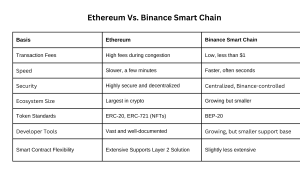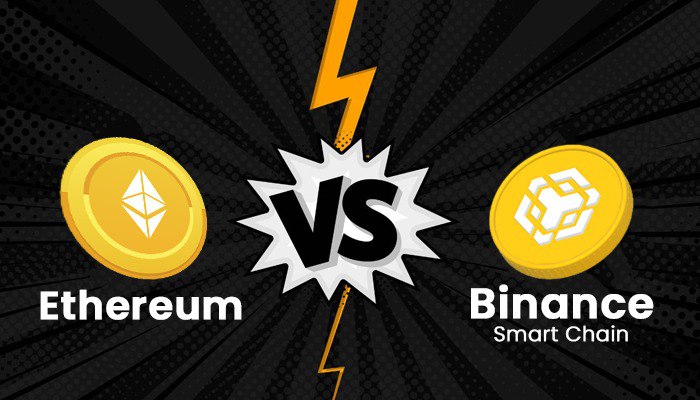When it comes to launching a cryptocurrency token, choosing the right blockchain is crucial. Among the many options available, Ethereum and Binance Smart Chain (BSC) are two of the most popular choices. Each offers distinct advantages and trade-offs that can impact your project’s success. Whether you are using a token maker, a token generator, or developing a custom smart contract, understanding the differences between these blockchains is essential.
Ethereum: The Pioneer of Smart Contracts
Ethereum, introduced in 2015, revolutionized blockchain technology by introducing smart contracts. It remains the most widely used blockchain for decentralized applications (dApps) and token creation. Here’s what makes Ethereum stand out:
Pros of Ethereum:
- Decentralization & Security – Ethereum has a vast, decentralized network with high security.
- ERC-20 Standard – The ERC-20 token standard is widely adopted, making it easier to list on exchanges.
- Robust Developer Ecosystem – Ethereum has a large community, extensive documentation, and developer tools.
- Interoperability – Many multi-chain platforms support Ethereum-based tokens.
Cons of Ethereum:
- High Gas Fees – Transaction fees can be costly, especially during network congestion.
- Scalability Issues – Despite upgrades like Ethereum 2.0, scalability remains a challenge.
Binance Smart Chain: A Cost-Effective Alternative
Binance Smart Chain (BSC) was launched in 2020 to provide a faster, more affordable alternative to Ethereum. It supports smart contracts and is compatible with Ethereum’s Ethereum Virtual Machine (EVM), making it easier for developers to migrate projects.
Pros of Binance Smart Chain:
- Low Transaction Fees – BSC offers significantly lower fees compared to Ethereum.
- Fast Transactions – Block times are much shorter, ensuring quicker transaction confirmations.
- EVM Compatibility – Developers can easily port Ethereum-based projects to BSC.
- Binance Ecosystem – Integration with Binance’s centralized exchange provides better liquidity options.
Cons of Binance Smart Chain:
- Centralization Concerns – Unlike Ethereum, BSC is more centralized, relying on a smaller number of validators.
- Security Risks – Some projects on BSC have been vulnerable to hacks and exploits.
Ethereum vs. Binance Smart Chain: A Feature Comparison

Which Blockchain Should You Choose for Your Token?
The choice between Ethereum vs Binance Smart Chain depends on your project’s specific needs:
- If security and decentralization are your top priorities, Ethereum is the better option.
- If low fees and fast transactions are critical for your project, BSC might be the way to go.
- If you’re looking for interoperability with other chains, Ethereum’s ecosystem is stronger.
- If you need a cost-effective solution for token creation, BSC provides a more budget-friendly approach.
Alternative Blockchains to Consider
While Ethereum and Binance Smart Chain are leading choices, other blockchains offer unique benefits:
- Polygon (MATIC): A Layer 2 solution for Ethereum, providing lower fees and faster transactions.
- Soneium (SONE): A high-performance blockchain designed for fast transactions and low fees.
- Avalanche (AVAX): Offers a scalable and highly interoperable platform.
- Core (CORE): A next-generation blockchain focused on decentralization, security, and efficiency.
Final Thoughts
Choosing between Ethereum and Binance Smart Chain requires evaluating factors like transaction costs, security, decentralization, and scalability. If you’re using a token generator or token maker, consider the blockchain’s fees, adoption, and ecosystem before making a decision. As the crypto space evolves, emerging blockchains may also offer compelling alternatives. No matter which blockchain you choose, ensuring a well-audited smart contract and seamless wallet connectivity will enhance your token’s success.
Ready to Create Your Token?
Whether you’re launching an ERC-20 or BEP-20 token, selecting the right platform is just the first step. Utilize auto-verification tools, seamless wallet connection, and multi-chain deployment to maximize efficiency and security. Start your seamless token creation journey with DeployTokens and rule the crypto space with your mind-blowing projects.
Which blockchain do you prefer for your project? Let us know in the comments!
